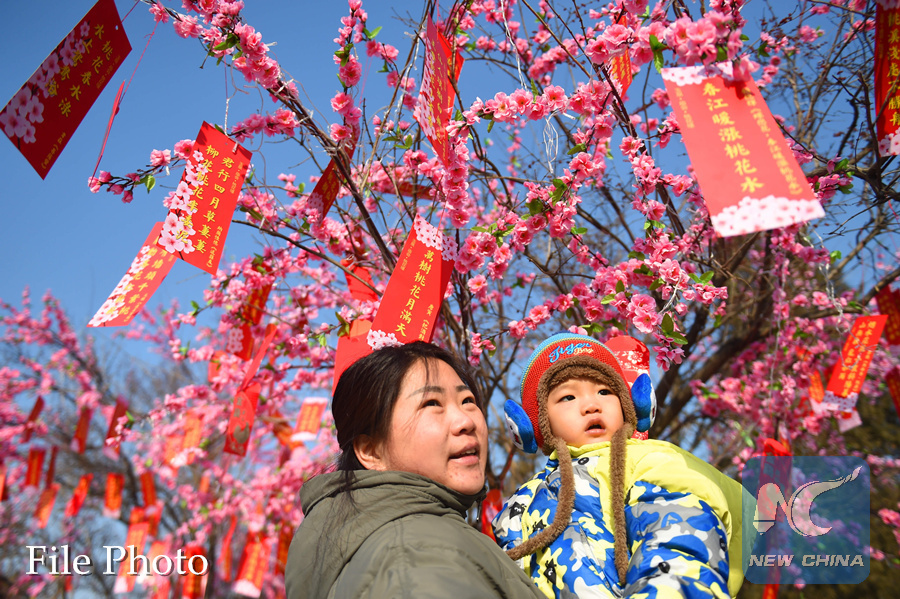
People pose for photos under a tree during a temple fair celebrating the Chinese Lunar NewYear in Hohhot, capital of north China's Inner Mongolia Autonomous Region, Feb. 2, 2017. (Xinhua/Deng Hua)
ULAN BATOR, Feb. 15 (Xinhua) -- Mongolians are set to celebrate the Lunar New Year to welcome the Year of the Dog, a traditional festival known as the "White Moon" in the country.
According to the lunar calendar, the White Moon this year begins on Friday, which symbolizes the start of spring and the end of a harsh winter.
The White Moon is actually a combination of ringing the old year out and the new year in, as well as a celebration when families get together.
As a great family festival in Mongolia with many ceremonies, the White Moon has been celebrated for several centuries by Mongolians.
The festival dates back to 1206 when the Great Mongol Empire was established. Back then, Mongolians celebrated the Lunar New Year in the early months of winter, calling it the "Dairy Festival" on the order of Genghis Khan.
The festival later became known as the "Herder's Festival" and was celebrated only by herders from 1952 to 1990, and has spread nationwide since. People celebrate it in hopes of having a plentiful new year and erasing all misfortunes of the previous year.
EVE OF WHITE MOON
The Eve of the Lunar New Year is known as "Bituun" in Mongolia, which means "new or dark moon," mainly because the moon can't be seen on this day and all unfinished businesses should be settled within the day.
It is seen as a preparatory day before the Bituun ceremony, with lots of food and drinks prepared. Mongolians believe that plenty of food and drinks symbolize a wealthy life in the coming year.
Mongolians clean up their home all day long, believing good luck comes with cleanliness.
People are customarily prohibited from drinking too much, talking about bad things, arguing with someone and staying hungry.
The Bittun ceremony begins after sunset. All families cook food and set the table for a feast with dairy products, drinks and sweets.
In the evening, Mongolians wear clean, new clothes and gather at their parents' home for dinner. During the meal, the elderly tell their children and young people folk tales and myths. Family members also play traditional games, for example knucklebones, using the knucklebones of sheep as a form of dice.
FIRST DAY OF WHITE MOON
Mongolians wake up before dawn on the first day of the White Moon. Wearing new traditional outfits, they brew tea and spray it to the ground to worship mother earth.
Offering White Moon greetings is the most important custom during the celebration, and has many strict rules to follow.
Traditionally, children and adults greet the eldest or the most senior family member first by grasping their elbows to show respect and say "Are you living peacefully?" in Mongolian. The elder person responds by kissing them on both cheeks.
Then all the guests sit around the feast table, and guests and elders exchange Khuurug -- a snuffle-bottle with fine-ground tobacco inside -- with its lid open and say "Are you celebrating well?"
The hostess serves tea with milk as well as traditional dishes, such as steamed sheep, or "utts", and a plate of traditional cookies placed in stacked rows in odd numbers. After the meal, the host offers gifts to guests when they are ready to leave.
WHITE MOON TABOOS
A husband and wife cannot greet each on the day of the White Moon since it is believed that they would have to part ways if they do so. Women also do not greet each other during their pregnancy, believing that otherwise the unborn child's sex could be switched.
Mongolians also believe that if they cut their hair on the first day of the Lunar New Year, some of their relatives would pass away during the year.
It is also a taboo to spend the first night of the White Moon outside the home, as it was believed the person could become a vagabond.
Money, in addition, should not be lent on Lunar New Year's Day, and all debts have to be paid by the eve. If someone owes you money, do not go to his or her home to demand it, as anyone who does so is said to be unlucky for the whole year.
On the seventh day of the new year, it is a taboo to go out to visit other relatives and friends, as the day is considered by Mongolians as a "black day."

